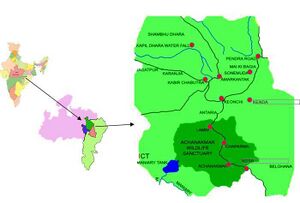Johila River
| Author:Laxman Burdak, IFS (R) |

Johila River (जोहिला नदी) is a tributary of Sone River. It has been mentioned as Jyotirathya and Jyeshthila in Mahabharata.
Origin
Variants
- Johila River/Johila (जोहिला नदी) (AS, p.374)
- Jyotirathya River/Jyotirathya (ज्योतिरथ्या) (AS, p.376)
- Jyeshthila River/Jyeshthila (ज्येष्ठिला) (AS, p.376)
- Jyeshthila Tirtha (ज्येष्ठिल) (AS, p.376)
- Johilla River/Johilla (जोहिल्ला नदी)
Jat clans
History
Amarkantak (अमरकंटक) is a pilgrim town in Anuppur district of Madhya Pradesh, India. Amarkantak region is a unique natural heritage area and is the meeting point of the Vindhya and the Satpura Ranges, with the Maikal Hills being the fulcrum. This is the place where the Narmada River, the Son River and Johilla River emerge.
जोहिला नदी
विजयेन्द्र कुमार माथुर[1] ने लेख किया है ...जोहिला नदी (AS, p.374) सोन नदी की सहायक नदी जो महाभारत वन पर्व 85,8 में वर्णित ज्योतिरथ्या या महाभारत सभा पर्व 9, 21 में उल्लिखित 'ज्येष्ठिला' है।
ज्येष्ठिल तीर्थ
ज्येष्ठिल तीर्थ (AS, p.376) ज्येष्ठिला नदी के तट पर तीर्थस्थान--'अथ जयेष्ठिलम आसाद्य तीर्थं परम दुर्लभम्'. इसका चंपकारण्य के पश्चात उल्लेख है. (दे. ज्येष्ठिला, चंपकारण्य)[2]
ज्येष्ठिला नदी
ज्येष्ठिला (p.376) - 'तृतीया ज्येष्ठिला चैव शोणश्चापि महानद:, चर्मण्वती तथा चैव पर्णाशा च महानदी' महाभारत सभा पर्व 9, 21. यहाँ शोण या सोन इस नदी का वर्णन है जिससे वन पर्व महाभारत 85,8 में उल्लिखित ज्योतिरथ्या, और ज्येष्ठिला एक ही जान पड़ती हैं। ज्येष्ठिला सोन की सहायक नदी- वर्तमान जोहिला है जैसा नाम-साम्य से भी प्रकट है। महाभारत वन पर्व 84,134 में उल्लिखित तीर्थ ज्येष्ठिल इसी नदी के तट पर सम्भवत: ज्येष्ठिला-शोण संगम पर अवस्थित रहा होगा।[3]
ज्योतिरथ्या नदी
ज्योतिरथ्या नदी (AS, p.376) सोन (शोण नदी, जो मध्य प्रदेश और बिहार में बहती है) की एक उपनदी है। इन दोनों के संगम पर प्राचीन काल में एक तीर्थ था, जिसका निर्देश महाभारत, वनपर्व 85,8 में है- 'शोणस्यज्योतिरथ्याया: संगमें नियत: शुचि तर्पयित्वापितृन देवानग्निष्टोमफललंलभेत्'। संभव है कि ज्योतिरथ्या महाभारत सभा पर्व 9,21 में उल्लिखित 'ज्येष्ठिला' है, जिसका शोण के साथ ही उल्लेख है। यदि यह अभिज्ञान ठीक है तो ज्योतिरथ्या और ज्येष्ठिला वर्तमान जोहिला के ही प्राचीन नाम हैं।[4]
In Mahabharata
- Jyeshthila Tirtha (ज्येष्ठिल) (Tirtha) Mahabharata (III.82.115)
- Jyeshthila River (ज्येष्ठिल) (River) Mahabharata (II.9.25)[5]
- Jyotirathya (ज्यॊतिरथ्या) (River)/(Tirtha) Mahabharata (III.83.8)
- Jyotiratha (ज्यॊतिरथा) (River) Mahabharata (VI.10.25),
Vana Parva, Mahabharata/Book III Chapter 82 mentions names Pilgrims. Jyeshthila (ज्येष्ठिल) (Tirtha) is mentioned in (III.82.115). [6].... proceed to the excellent woods of Champakaranya (चम्पकारण्य) (III.82.114) . By spending there one night, one acquireth the merit of giving away a thousand kine. Arriving next at Jyeshthila (ज्येष्ठिल) (III.82.115), that tirtha of rare worth, and passing one night there, one reapeth the fruit of the gift of a thousand kine. Beholding there (the image of) Visweswara of great splendour, with his consort the goddess, a person obtaineth, O bull among men, the region of Mitra-Varuna. By fasting there for three nights, a man acquireth the merit of the Agnishtoma sacrifice.
Vana Parva, Mahabharata/Book III Chapter 83 mentions names of Pilgrims. Jyotirathya (ज्यॊतिरथ्या) (River)/(Tirtha) is mentioned in Mahabharata (III.83.8).[7]....Residing with purity at the confluence of the Sona (शॊण) (III.83.8) and the Jyotirathya (ज्यॊतिरथ्या) (III.83.8), and offering oblations of water to the gods and the Pitris, a man reapeth the merit of the Agnishtoma sacrifice.
Bhisma Parva, Mahabharata/Book VI Chapter 10 describes geography and provinces of Bharatavarsha. Jyotiratha (जयॊतिरथा) (River) is mentioned in Mahabharata (VI.10.25). [8]....with Hiranwati; Chitravati, Chitrasena, and the mighty river Rathachitra, and Jyotiratha, and Viswamitra, and Kapinjala;....
External links
References
- ↑ Aitihasik Sthanavali by Vijayendra Kumar Mathur, p.374
- ↑ Aitihasik Sthanavali by Vijayendra Kumar Mathur, p.376
- ↑ Aitihasik Sthanavali by Vijayendra Kumar Mathur, p.376
- ↑ Aitihasik Sthanavali by Vijayendra Kumar Mathur, p.376
- ↑ तृतीया ज्येष्ठिला चैव शोणश्चापि महानदः। चर्मण्वती तथा चैव पर्णाशा च महानदी।। 2-9-25 विकिसोर्स
- ↑ अथ ज्येष्ठिलम आसाद्य तीर्थं परमसंमतम, उपॊष्य रजनीम एकाम अग्निष्टॊम फलं लभेत (III.82.115)
- ↑ शॊणस्य जयॊतिरथ्याश च संगमे निवसञ शुचिः, तर्पयित्वा पितॄन देवान अग्निष्टॊम फलं लभेत (III.83.8)
- ↑ हिरण्वतीं चित्रवतीं चित्रसेनां च निम्नगाम, रथचित्रां जयॊतिरथां विश्वामित्रां कपिञ्जलाम (VI.10.25)

